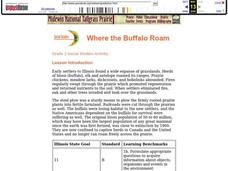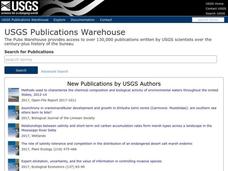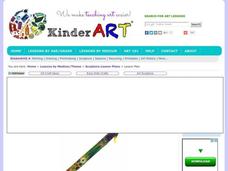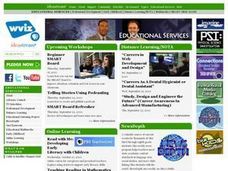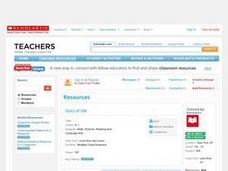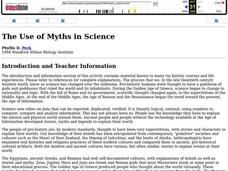Curated OER
Cave Diagram
Students examine limestone cave geology and hydology. They study cave vocabulary.
Curated OER
Explosive Ideas: Oregon quarter reverse
Explore Earth and her amazing layers with this lesson plan on planetary change. Young scholars will research the ways in which Earth's layers cause change. They will complete a "Tectonic Puzzle" and use a worksheet to answer questions...
Curated OER
Aerosol Lesson: Science - Graphing SAGE II Data
Students examine and plot atmospheric data on bar graphs.
Curated OER
Where the Buffalo Roam
Second graders explore what life in the Chicago area was like hundreds of years ago. They discuss how settlers impacted the environment, and why there are no longer herds of buffalo in the Chicago area today. They read an article and...
Curated OER
Mother Nature Has Her Say
Students use their creative writing skills to develop interview questions for Mother Nature. Using writing, they respond to the questions another student developed and use the internet to research any topic they need more information on....
Curated OER
Exploring the Hudson in 1609
While this lesson focuses on a study of the Hudson River, it could be used as a template for a discussion of map skills, converting measurements, and plotting a route. The lesson includes vocabulary and other resources to make it a...
Curated OER
Soaring High with Kites
Young scholars make kites from patterns. They write haiku poetry. They listen to stories about kite festivals in different countries.
Curated OER
Where Does Maple Syrup Come From?
In this maple syrup worksheet, students read an informational article about the discovery of maple syrup, how we get maple syrup today, the "sugar house", how to grade it, and a recipe for a snow cone. Students answer nine true and false...
Curated OER
Growing Plants in Science and Literature, More Than an Empty Pot
Students read The Empty Pot as an introduction to plants. For this planting lesson, students understand a sequence of events in the book and relate it to the sequence of a plants life. Students grow plants and record information in...
Curated OER
Busting More Myths Using the Scientific Method
Use the Mythbusters model to jazz up your scientific method lessons!
Curated OER
Map Scale
Third and fourth graders are introduced to the concept of map scale. Using an illustration, they discuss if it shows the actual size of the object and why scale is used to represent areas. They use some items in the illustration to...
Curated OER
Topo Map Mania!
Students read and use topographical maps. They also use a compass to find bearing to an object on a map and in the classroom. Ask your students how they might travel to somewhere they have never been to befo
Curated OER
RAINSTICKS
Students create a rainstick from recycled materials and begin learning about the "nature" of the rainforest.
Curated OER
Birthday Moons
Learners examine the lunar phases by locating and graphing the Moon phase of their own birthdays. They listen to and discuss lunar myths and create their own Birthday Moon Stories.
Curated OER
Gazing At Cosmic Pinballs
Students explore the world of stars. They see that the color of a star tells how hot or cold it is, that stars come in different sizes. and that stars are moving through space. They draw lines connecting start to star.
Alabama Learning Exchange
The Sun and the Earth
Third graders study and diagram the positions of the Earth and sun during the four seasons. They predict weather for cities in the northern and southern hemispheres.
Curated OER
Story of Silk
Students investigate the steps of the silk-making process through a reading of the story, "The Empress and the Silkworm" by Toy Hong. Sequencing cards are utilized to enhance the process and a silkworm's cocoon is unravelled.
Curated OER
Depth Line
Students use adding machine tape to plot increasing ocean depths and deep sea historical events.
Curated OER
Ecozones Project
Students examine, detail and produce a display about a particular ecozone in Canada. They produce a detailed wall map, written report and a summary sheet.
Curated OER
Design an Island
Students explore islands. They create a two- or three-dimensional map of an island. They explain how the topography of an area influences the location of water sources, ecosystems, and human settlements. Lesson includes adaptations for...
Curated OER
The Use of Myths in Science
Students examine folk tales to determine the basis for scientific myths. They demonstrate through the discussion of the folk tales that the perception of the world has changed as new information is gained. They write their own folk...
Curated OER
The Sun and Moon
Learners understand basic concepts about Earth, the Sun and the Moon,
such as relative movement and the phases of the moon. Through discussion, looking at pictures, listening to Native American stories, observing, and building models,...
Curated OER
The Spider Beside Her
Second graders are introduced to the characteristics of spiders. In groups, they compare and contrast spiders to different insects to discover spiders are not an insect at all. In groups, they create a model of a spider and discuss its...
Curated OER
Archaeology and Storytelling
Students identify and interpret both individual families and whole cultures learn about their pasts by collecting and analyzing stories and artifacts. Then they identify that not all archaeological finds readily reveal their history to...
Other popular searches
- Myths and Legends
- Legends and Folktales
- Map Legends
- Greek Myths and Legends
- Urban Legends
- Native American Legends
- Maori Myths and Legends
- Children Literature Legends
- Comet Legends
- American Indian Legends
- Arthurian Legends
- Coyote Legends





